Fleurs du Mal Magazine


Or see the index
Het nagelaten werk van Franz Kafka is dankzij zijn vriend Max Brod bewaard gebleven, maar na het overlijden van Brod in 1968 begint een hevige en absurde strijd om het eigendomsrecht.
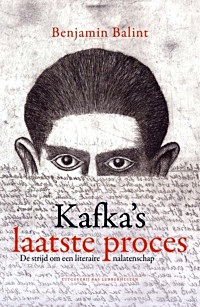 De originele, handgeschreven versies van meesterwerken als Het proces en De gedaanteverwisseling komen achtereenvolgens in handen van Brods secretaresse Esther Hoffe en haar dochter Eva.
De originele, handgeschreven versies van meesterwerken als Het proces en De gedaanteverwisseling komen achtereenvolgens in handen van Brods secretaresse Esther Hoffe en haar dochter Eva.
Er ontvouwt zich echter een juridisch getouwtrek als zowel Israël als Duitsland het werk claimen.
Duitsland, waar drie zussen van Kafka stierven tijdens de Tweede Wereldoorlog, wil de schrijver recht doen, en Israël meent rechten te hebben als Joodse staat en Kafka’s gedroomde land.
Kafka’s laatste proces leest als een waargebeurde thriller, maar maakt pijnlijk duidelijk hoe de Joodse schrijver Franz Kafka inzet wordt van zionistische claims. In de verbeten strijd die de twee landen uitvechten, lijken ze vooral de geschiedenis te willen herschrijven.
Benjamin Balint woont in Jeruzalem, waar hij verbonden is aan het Van Leer Institute. Hij schrijft o.a. voor Haaretz en de Wall Street Journal. Over de Joods-Amerikaanse schrijvers die publiceerden in het tijdschrift Commentary, schreef hij Running Commentary (2010).
Benjamin Balint (Auteur)
Kafka’s laatste proces.
De strijd om een literaire nalatenschap
Vertaling Frank Lekens
Oorspronkelijke titel:
Kafka’s Last Trial.
The Case of a Literary Legacy
Omslagtekening Jirí Slíva
Omslag Bart van den Tooren
Uitg. Bas Lubberhuizen
304 pagina’s
15 x 23 cm
Geïllustreerde paperback
ISBN 9789059375284
Verschenen: januari 2019
€ 24,99
# New books
Benjamin Balint
Kafka’s Last Trial.
The Case of a Literary Legacy
• fleursdumal.nl magazine
More in: - Book News, - Bookstores, Archive A-B, Archive K-L, Archive K-L, Art & Literature News, Franz Kafka, Kafka, Franz, Kafka, Franz
Een lange vrachtwagen van Bouwbedrijf Leon van Wijk en Zonen stopt bij de silo. Een kraan takelt bouwmateriaal uit de bak: planken, stalen stutbalken, steigermateriaal, een werkkeet en een bouwlift. Een ploegje arbeiders begint met het bouwen van de steigers.
 Met gemengde gevoelens ziet Mels het aan. Als een moederkloek heeft het enorme gebouw altijd het dorp beheerst. Tot zomaar, van de ene op de andere dag, aan de werknemers werd verteld dat het bedrijf verkocht was en de productie werd gestaakt. Terwijl het toch volop winst maakte en er een paar maanden eerder nog een uitbreiding was aangekondigd. De fabriek was ten onder gegaan aan haar eigen succes en was opgekocht door de concurrentie om te worden uitgeschakeld.
Met gemengde gevoelens ziet Mels het aan. Als een moederkloek heeft het enorme gebouw altijd het dorp beheerst. Tot zomaar, van de ene op de andere dag, aan de werknemers werd verteld dat het bedrijf verkocht was en de productie werd gestaakt. Terwijl het toch volop winst maakte en er een paar maanden eerder nog een uitbreiding was aangekondigd. De fabriek was ten onder gegaan aan haar eigen succes en was opgekocht door de concurrentie om te worden uitgeschakeld.
De vrachtwagen van het bouwbedrijf vertrekt. De chauffeur steekt een hand op. Mels groet terug.
Even later loopt de opzichter naar het café. Hij staat stil op de brug en kijkt naar het water.
`Viswater?’
`Vroeger zat er forel in’, zegt Mels. `Als jongen heb ik er genoeg gevangen. En aal.’
`Nu niets meer?’
`Ze vangen soms baars. Een enkele snoek.’
`Kom ik zondag eens kijken. Ik gooi graag een hengeltje uit.’
Hij loopt door naar het café en komt even later naar buiten met een pakje shag.
`Wat komt er in de silo?’ vraagt Mels.
`Appartementen.’ De man rolt een sigaret. `Ze worden verkocht als exclusief.’
`Dat ding is toch niet apart?’
`Ze zeggen dat het een monument is. Een dorpsbepalend beeld. Zoiets. Hij moet blijven staan vanwege het historisch belang.’ Hij likt zijn shagje dicht. `Ze hadden er beter een bom op kunnen gooien. Hadden ze plaats gehad voor echte huizen. Mij maakt het niks uit. Wij hebben er een mooie klus aan.’
`Ik wil je wat vragen. Ik zoek iemand om een paar pannen op mijn dak te vervangen.’
`Heb je nog pannen?’
`Genoeg.’
`Ik stuur wel een mannetje. Stop hem maar wat toe. Altijd goed.’
`Dank je.’
De man loopt verder.
`Toch missen we de fabriek’, zegt Mels nog. `We waren eraan gewend. Het lawaai in de maalderij was onbeschrijflijk mooi.’
`Mooi?’
`De een vindt dit mooi, de ander dat.’
`Gelukkig dat we allemaal van andere meisjes houden,’ lacht de man, `anders bleven er veel over.’
Ton van Reen: Het diepste blauw (090)
wordt vervolgd
• fleursdumal.nl magazine
More in: - Book News, - Het diepste blauw, Archive Q-R, Reen, Ton van
Songs can be incredibly prophetic, like subconscious warnings or messages to myself, but I often don’t know what I’m trying to say till years later.
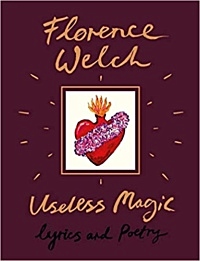 Or a prediction comes true and I couldn’t do anything to stop it, so it seems like a kind of useless magic.
Or a prediction comes true and I couldn’t do anything to stop it, so it seems like a kind of useless magic.
The first book from songwriter and Florence + the Machine frontwoman Florence Welch, Useless Magic brings together 288 pages of lyrics, never-before-seen poetry and sketches.
Taken from Welch’s own scrapbook-style journals, the book offers an extraordinary chance to see inside the creative alchemy behind some of Florence + The Machine’s chart-topping anthems.
It also offers unique personal insights into Welch’s own life from her experiences of suffering with an eating disorder to her thoughts on love and what it means to live your life in the glare of the spotlight. .
Useless Magic:
Lyrics and Poetry
by Florence Welch
Publisher Penguin Books Ltd
Imprint Fig Tree
London, 5 July 2018
Number of pages: 288
Language English
ISBN-10: 0241347939
ISBN-13: 978-0241347935
€ 28,95
# New books
Florence Welch
Lyrics and Poetry
• fleursdumal.nl magazine
More in: - Book News, - Bookstores, Archive W-X, Archive W-X, Art & Literature News, Florence Welch
Willem Wilmink (1936-2003) is een van de meest geliefde dichters van Nederland.
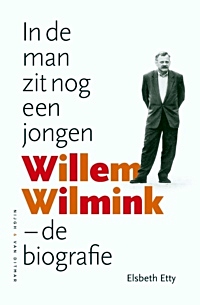 Zijn eenvoudige maar treffende gedichten en liedjes, veelal geschreven voor legendarische tv-programma’s als De Stratemakeropzeeshow, J.J. de Bom en De film van Ome Willem, spreken iedereen aan. ‘De oude school’, ‘Deze vuist op deze vuist’ en ‘Ben Ali Libi’ behoren tot de canon van de Nederlandse literatuur. Hetzelfde geldt voor Wilminks hertalingen van Middeleeuwse klassiekers. Hij was een groot kenner van poëzie uit alle tijdvakken en in al haar verschijningsvormen.
Zijn eenvoudige maar treffende gedichten en liedjes, veelal geschreven voor legendarische tv-programma’s als De Stratemakeropzeeshow, J.J. de Bom en De film van Ome Willem, spreken iedereen aan. ‘De oude school’, ‘Deze vuist op deze vuist’ en ‘Ben Ali Libi’ behoren tot de canon van de Nederlandse literatuur. Hetzelfde geldt voor Wilminks hertalingen van Middeleeuwse klassiekers. Hij was een groot kenner van poëzie uit alle tijdvakken en in al haar verschijningsvormen.
Zijn werk is doortrokken van heimwee naar een veilige kinderwereld die nooit heeft bestaan. Naar eigen zeggen is Wilmink altijd elf jaar gebleven, wat aanvankelijk zijn loopbaan en privéleven ernstig frustreerde, maar tegelijkertijd zijn poëtische kapitaal bleek. Met humor en zelfspot maakte hij zijn lange tijd door miskenning en afwijzing getekende leven leefbaar.
Voor In de man zit nog een jongen sprak neerlandicus en journalist Elsbeth Etty met tientallen tijdgenoten en intimi van Wilmink. Het resultaat is een intiem en niets verhullend portret.
Elsbeth Etty (1951) is literair criticus, columnist en voormalig bijzonder hoogleraar literaire kritiek. Ze publiceerde o.a. verschillende essay- en columnbundels. Voor Liefde is heel het leven niet, haar biografie van Henriette Roland Holst, werd ze genomineerd voor de AKO Literatuurprijs en bekroond met de Gouden Uil en de Busken Huetprijs.
In de man zit nog een jongen
Willem Wilmink – De biografie
Auteur: Elsbeth Etty
Uitgeverij: Nijgh & van Ditmar
NUR: 321
Taal Nederlands
Bladzijden 552 pp.
Bindwijze Hardcover
ISBN: 9789038806112
Publicatiedatum: 22-01-2019
Prijs: € 34,99
# New books
Willem Wilmink – De biografie
Auteur: Elsbeth Etty
• fleursdumal.nl magazine
More in: #Biography Archives, - Book News, - Book Stories, - Bookstores, Archive E-F, Archive W-X, Archive W-X, Art & Literature News, Willem Wilmink
Er is steeds minder te koop in de winkel van juffrouw Fijnhout. Er komt weinig geld binnen. En daar moet wat op gevonden worden, want ze moet ook haar medicijnen kunnen betalen. En de abonnementen op de meer dan twintig missieblaadjes.
 Daar zitten ze steeds in te bladeren, op zoek naar foto’s van China. Die knippen ze uit en plakken ze in. Ze hebben al drie schriften vol met foto’s van katholieke Chinese kinderen, zodat het lijkt of bijna heel China katholiek is, maar in werkelijkheid zijn het er maar een paar duizend tussen de miljoenen. Volgens Tijger kijken de Chinezen zelf naar de katholieken zoals de mensen hier naar de Jehova’s getuigen kijken: een paar fanatieke dwepers die de bijbel naar hun hand zetten en hun kinderen nog liever dood laten gaan dan ze in te laten enten tegen pokken en kinderverlamming.
Daar zitten ze steeds in te bladeren, op zoek naar foto’s van China. Die knippen ze uit en plakken ze in. Ze hebben al drie schriften vol met foto’s van katholieke Chinese kinderen, zodat het lijkt of bijna heel China katholiek is, maar in werkelijkheid zijn het er maar een paar duizend tussen de miljoenen. Volgens Tijger kijken de Chinezen zelf naar de katholieken zoals de mensen hier naar de Jehova’s getuigen kijken: een paar fanatieke dwepers die de bijbel naar hun hand zetten en hun kinderen nog liever dood laten gaan dan ze in te laten enten tegen pokken en kinderverlamming.
Om de rekken in de winkel minder leeg te laten lijken leggen de jongens er van alles bij. Zomerappels, maar die krijgen al vlug een oud vel. Niemand koopt appels, omdat de meeste mensen zelf zomerappels in de tuin hebben. Overbodig speelgoed. Te klein geworden laarzen. Schaatsen met lint, maar wie koopt er in de zomer schaatsen? Oude jaargangen van missieblaadjes, maar iedereen wordt al onder die dingen bedolven. Soms wijst juffrouw Fijnhout iets aan in haar kast om in de rekken te zetten, een servies, kristallen glazen, een blauwe puddingvorm in de vorm van een vis, een zilveren asbak. Ze doet er glimlachend afstand van omdat ze ze toch niet meer gebruikt. Soms koopt iemand wat, niet omdat hij iets nodig heeft, maar omdat niemand wil dat juffrouw Fijnhout in armoede sterft.
In de winkel blijven vooral spullen over die wachten op volgende seizoenen, voor de herfst en de winter. Overgebleven pakjes zaaigoed voor tomaten, bonen en prei, die onder een luchtdichte glazen stolp worden bewaard en ook volgend jaar nog goed zijn.
Bij het leegruimen van een kast vindt Mels spullen die jarenlang achter andere spullen verborgen zijn gebleven. Een foto van een jongeman met de toen nog jonge juffrouw Fijnhout, een meisje nog. De jongeman heeft een arm rond haar schouder geslagen. Mels denkt dat de foto met opzet op de bovenste plank is gelegd. Achteloos legt hij hem op de hoek van de tafel. Ze ziet het direct en pakt hem op.
`Nadat die foto is gemaakt, heb ik hem nooit meer gezien.’
`Wie is het?’
`Tom, de oudste zoon van de weduwe Hubben-Houba. De broer van directeur Frits. Het was zijn laatste dag hier. Hij ging studeren, in Amerika. Een paar jaar later zou hij terugkomen, om zijn moeder op te volgen en met mij te trouwen. Ik heb nooit meer iets van hem gehoord. Zijn jongere broer Frits heeft de zaak alleen overgenomen.’
`Wist zijn moeder niet waar hij was?’
`Dat denk ik wel, maar die sprak niet met mij. De rijk geworden familie haalde haar neus op voor de dochter van een dorpssmid.’
`En andere jongens?’ vraagt Mels, de foto bekijkend waarop ze een knappe, jonge vrouw is.
`Eerst heb ik te lang gewacht. En daarna was ik te zeer teleurgesteld. En later vond ik het wel goed zoals het ging. Van mijn winkel kon ik bestaan.’
Mels ruimt alles weer op. Hij legt de foto’s op een schapje waar juffrouw Fijnhout ze kan pakken zonder op te staan.
Tijgers moeder komt Mels aflossen, want juffrouw Fijnhout mag niet meer alleen zijn. Om de beurt blijven de vrouwen uit de buurt ‘s nachts bij haar.
Mels gaat naar huis.
Ze hebben bezoek. De moeder van Jacob zit in de kamer. Ze drinken thee.
`Ik heb wat voor je meegebracht’, zegt Jacobs moeder. Uit haar tas haalt ze het schrift. `Jacob wilde dat ik de verhalen die hij heeft opgeschreven aan jou gaf.’
`Wilt u ze zelf niet houden?’
`Ik kan niet lezen. Jacob heeft vier jaar in een sanatorium gelegen. Daar heeft hij leren lezen en schrijven.’
`En vioolspelen?’
`Wij maken allemaal muziek. Dat is hem met de paplepel ingegoten.’
`Dank u voor het schrift’, zegt Mels. `Jammer dat ik Jacob maar zo kort heb gekend.’
`Lang genoeg om vrienden te worden.’ Jacobs moeder staat op. Mels’ moeder brengt haar naar de deur.
`U komt nog maar eens aan’, zegt moeder.
`Wij gaan hier weg’, zegt Jacobs moeder. `Wij hebben hier weinig geluk gevonden. Misschien gaat het ons ergens anders beter.’
Ton van Reen: Het diepste blauw (089)
wordt vervolgd
• fleursdumal.nl magazine
More in: - Book News, - Het diepste blauw, Archive Q-R, Reen, Ton van
Onlangs verscheen de dichtbundel Gedichten van Paul Bezembinder, bij Uitg. Pittige Pixels Amsterdam, 2018, Eerste druk, 104 pag., ISBN 978-90-829774-0-0.
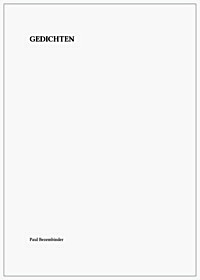 Bezembinder (1961) studeerde theoretische natuurkunde in Nijmegen. In zijn poëzie zoekt hij in vooral klassieke versvormen en thema’s naar de balans tussen serieuze poëzie, pastiche en smartlap.
Bezembinder (1961) studeerde theoretische natuurkunde in Nijmegen. In zijn poëzie zoekt hij in vooral klassieke versvormen en thema’s naar de balans tussen serieuze poëzie, pastiche en smartlap.
Zijn gedichten (Nederlands) en vertalingen (Russisch – Nederlands) verschenen in verschillende (online) literaire tijdschriften, waaronder in het bijzonder op fleursdumal.nl. De bundel Gedichten is zijn tweede bundel.
Bezembinders eerste bundel, Kwatrijnen. Filosofische Verkenningen, verscheen in de reeks digitale publicaties van fleursdumal.nl: Fantom Ebooks.
De reeks is een uitgave van Art Brut Digital Editions, die onregelmatig bijzondere kunst- en literatuurprojecten publiceert. Deze bundel is als pdf op de site van fleursdumal.nl te vinden.
Meer voorbeelden van Bezembinders werk zijn te vinden op de website van de auteur, paulbezembinder.nl
Paul Bezembinder
Kwatrijnen
Uitgeverij. Pittige Pixels Amsterdam,
2018 Eerste druk,
104 pag.,
ISBN 978-90-829774-0-0
De bundel is per e-mail te bestellen.
Prijs: €17.50.
www.paulbezembinder.nl
• fleursdumal.nl magazine
More in: - Book Lovers, - Book News, Archive A-B, Archive A-B, Art & Literature News, Bezembinder, Paul, PRESS & PUBLISHING
Op 24 januari 2019 verscheen ‘Fantoommerrie’ de nieuwe dichtbundel van Marieke Lucas Rijneveld, een van de grootste nieuwe talenten van de Nederlandse letteren.
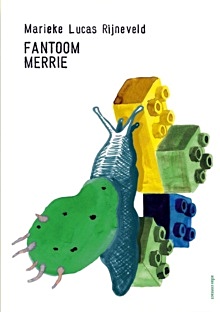 Je zou kunnen zeggen dat deze bundel verder gaat waar haar vorige bundel,‘Kalfsvlies’, was opgehouden, maar dat suggereert dat we met een vervolg te maken hebben, en dat is niet zo.
Je zou kunnen zeggen dat deze bundel verder gaat waar haar vorige bundel,‘Kalfsvlies’, was opgehouden, maar dat suggereert dat we met een vervolg te maken hebben, en dat is niet zo.
Deze bundel is een nieuwe verkenning in het universum van Rijneveld, dat paradoxaal genoeg aan de ene kant compleet onnavolgbaar is, maar aan de andere kant ook onmiddellijk herkenbaar en altijd eigen. Over een oma die onsterfelijk had moeten zijn, het noodlottig einde van een onvoorzichtige kat, over dromen natuurlijk: mooie en lelijke, over bidden om speelgoed, de zithouding van de schrijver – en over voorleesvaders, die lastige vragen krijgen: ‘waar komen kinderen vandaan als ouders nooit kussen?
‘Fantoommerrie’ is een dichtbundel om in te verdwalen, en dan te besluiten om er te blijven.
Marieke Lucas Rijneveld
Fantoommerrie
Gedichten
Gepubliceerd 24 januari 2019
Uitgeverij Atlas Contact
Pagina’s 64
Type Paperback / softback
ISBN 9789025453459
€ 19,99
• fleursdumal.nl magazine
More in: - Book News, Archive Q-R, Archive Q-R, Art & Literature News, Marieke Lucas Rijneveld, Rijneveld, Marieke Lucas
Het was Frans-Joseph die de nieuwe tijd naar het dorp had gehaald, toen hij het gezellenhuis had laten bouwen. Jonggezellen op kamertjes hadden meisjes nodig. Een van de kasteleins was op die behoefte ingesprongen, had rode lampen voor het raam gezet en meisjes uit de stad laten komen.
 Frans-Joseph dacht als een grootindustrieel. Hij was ook de man die het grote flatgebouw had laten bouwen, net niet zo hoog als de silo. Zestig woningen in vier lagen, niet ver van de fabriek. Flats voor buitenlandse gezinnen met veel kinderen die later, naar hij dacht, vanzelf in de fabriek zouden gaan werken. Maar daar had hij zich in misrekend. Met de fabriek liep het mis toen de kinderen groot waren. Bovendien wilden de zonen van de gastarbeiders geen werkezels zijn zoals hun vaders.
Frans-Joseph dacht als een grootindustrieel. Hij was ook de man die het grote flatgebouw had laten bouwen, net niet zo hoog als de silo. Zestig woningen in vier lagen, niet ver van de fabriek. Flats voor buitenlandse gezinnen met veel kinderen die later, naar hij dacht, vanzelf in de fabriek zouden gaan werken. Maar daar had hij zich in misrekend. Met de fabriek liep het mis toen de kinderen groot waren. Bovendien wilden de zonen van de gastarbeiders geen werkezels zijn zoals hun vaders.
Mels rommelt wat in de paperassen. Vraagt zich af of hij al de kladjes en volgeschreven vellen toch nog kan ordenen tot een boek. Een exemplaar voor zichzelf. Na zijn dood kan dat naar het archief van de gemeente.
Hij heeft moeite om het verhaal rond te maken. Hij zit met te veel losse stukjes. Van de arbeidersfamilies die in de jaren zeventig naar het dorp kwamen, weet hij maar weinig. In de flats is hij nooit geweest.
Vanaf de dag dat de fabriek gesloten is en de arbeiders uit de uitgewoonde flatwoningen zijn vertrokken, op zoek naar werk elders of door verhuizing naar de nieuwe wijken in het dorp, staat de flat erbij als een blind bakbeest. Kapotgegooide ruiten. Uitgebroken sponningen. Graffiti, waaruit nog steeds de haat van de nieuwkomers tegen de oorspronkelijke dorpsbevolking af te lezen is. En omgekeerd. Het heeft nooit geboterd tussen de flatbewoners en de dorpelingen.
Er zijn nog een paar flats bewoond. Enkele weduwvrouwen die nergens naartoe kunnen en een halfdemente man die wacht op een plaats in een inrichting. En mevrouw Lecoeur, de hoerenmadam, die er, samen met een paar jongere vrouwen, mannen ontvangt. Iedereen spreekt er schande van. Niemand doet er wat aan. Mels weet niet wat hij van haar moet denken. In het café, waar ze elke ochtend komt en koffie met cognac drinkt, praat hij wel eens met haar. Ze is innemend. Als ze over de mannen praat die haar meisjes bezoeken, is het net alsof ze het over haar jongens heeft. In haar ogen zijn mannen kinderen die beschermd en getroost moeten worden.
Hij doet de mappen dicht, trekt zijn jas aan, slaat de plaid over zijn benen, rolt naar de lift en gaat naar beneden.
Hij weet dat Lizet in de keuken is en luistert. Het blijft stil. Ze negeert hem.
Hij opent de deur en rijdt naar buiten.
Even stopt hij bij de marktkramen die ze aan het opbouwen zijn. Eén middag in de week is er markt. Een kraam met groenten en fruit, een kaaswagen, een viskar, een poelier met roze kippen en konijnen, een broodjesbar, een Turkse kraam met olijven, dadels en paprika’s.
Bij de bakkerskraam koopt hij krentenbollen. Met de zak broodjes op schoot rijdt hij de straat uit.
Ton van Reen: Het diepste blauw (088)
wordt vervolgd
• fleursdumal.nl magazine
More in: - Book News, - Het diepste blauw, Archive Q-R, Reen, Ton van
Hannah Sullivan’s debut collection is a revelation – three long poems of fresh ambition, intensity, and substance.
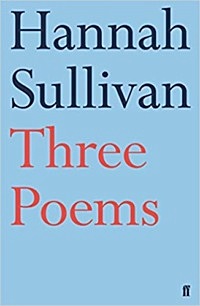 Though each poem stands apart, their inventive and looping encounters make for a compelling unity.
Though each poem stands apart, their inventive and looping encounters make for a compelling unity.
“You, Very Young in New York” captures a great American city, in all its alluring detail. It is a wry and tender study of romantic possibility, disappointment, and the obduracy of innocence.
“Repeat until Time” begins with a move to California and unfolds into an essay on repetition and returning home, at once personal and philosophical.
“The Sandpit after Rain” explores the birth of a child and the loss of a father with exacting clarity.
In Three Poems, readers will experience Sullivan’s work with the same exhilaration as they might the great modernizing poems of Eliot and Pound, but with the unique perspective of a brilliant new female voice.
Hannah Sullivan lives in London with her husband and two sons and is an Associate Professor of English at New College, Oxford. She received her PhD from Harvard in 2008 and taught in California for four years.
She is currently associate professor of English at New College, Oxford. Her study of modernist writing, The Work of Revision, was published in 2013 and awarded the Rose Mary Crawshay Prize by the British Academy. Her debut poetry collection, Three Poems, was published by Faber in 2018 and was awarded the prestigious TS Eliot Prize.
Three Poems
by Hannah Sullivan
Paperback: 80 pages
Publisher: Faber & Faber; Main edition (18 Jan. 2018)
Language: English
ISBN-10: 9780571337675
ISBN-13: 978-0571337675
ASIN: 0571337678
Product Dimensions: 15.9 x 1.3 x 21 cm
# new poetry
Three Poems
by Hannah Sullivan
• fleursdumal.nl magazine
More in: - Book News, - Bookstores, Archive S-T, Archive S-T, Art & Literature News, Awards & Prizes
Franz Kafka remains one of the most influential writers of the twentieth century. 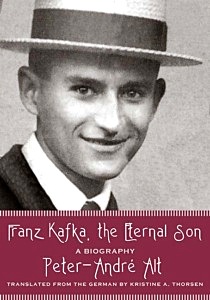
His novels, stories, and letters are still regarded today as the epitome of the dark, fascinating, and uncanny, a model of the modernist aesthetic.
Peter-André Alt’s landmark biography, Franz Kafka, the Eternal Son, recounts and explores Kafka’s life and literary work throughout the cultural and political upheavals of central Europe.
Alt’s biography explores Franz Kafka’s own view of life and writing as a unity that shaped his identity. He locates links and echoes among the author’s work, life, and surroundings, situating him within the traditions of Prague’s German literature, modernity, psychoanalysis, and philosophy as well as within its Jewish culture, arts, theater, and intellectual tradition.
In this biographical tour de force, Kafka emerges as an observant flaneur and wistful loner, an anxious ascetic, an ecstatic and skeptic, a specialist in terror, and a master of irony. Alt masterfully illuminates Kafka’s life not as source material but as a mirror of his literary genius. Readers begin to see Kafka’s unforgettable novels and stories as shards reflecting the life of their creator.
About the Author
Peter-André André Alt is a German literary scholar and the president of the Free University in Berlin.
Kristine A, Thorsen is a lecturer emeritus of German at Northwestern University.
Franz Kafka, the Eternal Son
A Biography
Contributors
Peter-André Alt (Author)
Kristine Thorsen (Translator)
Publication Date September 2018
Categories Biography
704 pages
Trim Size 7 x 10
ISBN 0-8101-2607-9
Northwestern University Press
-Cloth Text
– $120.00
ISBN 978-0-8101-6243-3
-Paper Text
– $45.00
ISBN 978-0-8101-2607-7
# new books
Franz Kafka
A Biography
• fleursdumal.nl magazine
More in: - Book News, - Book Stories, Archive A-B, Archive K-L, Archive K-L, Art & Literature News, Franz Kafka, Kafka, Franz, Kafka, Franz, MONTAIGNE
Ian Buruma, (Den Haag, 1951) is een internationaal befaamd essayist, historicus en Azië-deskundige. Hij schrijft regelmatig voor The New Yorker, The New York Review of Books en in ons eigen land voor NRC Handelsblad, en werkte mee aan documentaires voor de BBC en CNN.
 Momenteel is hij hoogleraar Democracy, Human Rights and Journalism aan het Bard College in New York.
Momenteel is hij hoogleraar Democracy, Human Rights and Journalism aan het Bard College in New York.
In 2008 ontving Buruma de Erasmusprijs voor zijn buitengewone bijdrage aan de Nederlandse cultuur.
Tot zijn bekendste boeken horen Occidentalisme, De spiegel van de zonnegodin, Dood van een gezonde roker, Het loon van de schuld en 1945. Biografie van een jaar en Hun beloofde land. Mijn grootouders in tijden van liefde en oorlog. In 2018 verscheen Tokio mon amour. Japanse avonturen, het portret van een jonge schrijver en van de stad die hem mede vormde.
Op donderdag 25 april a.s. ontvangt Ian Buruma de Gouden Ganzenveer 2019.
• fleursdumal.nl magazine
More in: - Book Lovers, - Book News, Archive A-B, Art & Literature News, Awards & Prizes, PRESS & PUBLISHING
Mels is met zijn vader in het café en mag bier tappen omdat de kastelein meedoet met kaarten.
Hij bedient de paar mannen die op het terras zitten.
 Mannen van het soort dat hier eerst verdwaald leek, maar van wie hij nu weet dat het wandelaars zijn die de Wijer nalopen. Van de monding van de beek in de rivier terug naar de bron. Ze dragen hoge laarzen om door de broeklanden en rietvelden te stappen.
Mannen van het soort dat hier eerst verdwaald leek, maar van wie hij nu weet dat het wandelaars zijn die de Wijer nalopen. Van de monding van de beek in de rivier terug naar de bron. Ze dragen hoge laarzen om door de broeklanden en rietvelden te stappen.
Over hun rug kijkt hij mee naar de kaart van het riviertje en het opengeslagen boek op tafel. Hij verbaast zich erover dat de Wijer meer dan honderd kilometer lang is en dat de bron ergens ligt bij een dorp dat Weierwiese heet. En dat het officieel geen beek maar een rivier is. En dat er honderdtachtig soorten vis in zitten, terwijl hij er maar tien kent. En dat hij nog nooit een zoetwaterkreeft met schaarvormige kaken heeft gezien. Geen wonder, want volgens het onderschrift bij het plaatje van het dier is het nog geen halve centimeter groot.
De mannen drinken chocomel. De bierdrinkende kerels die zitten te kaarten, lachen hen uit. Mels is boos, vooral over de opmerkingen van meneer Frans-Joseph. Die scheldt de wandelaars uit voor mietjes en hoerenlopers. Het is extra gênant omdat iedereen weet dat hij zelf een hoerenloper is.
Ton van Reen: Het diepste blauw (087)
wordt vervolgd
• fleursdumal.nl magazine
More in: - Book News, - Het diepste blauw, Archive Q-R, Reen, Ton van
Thank you for reading Fleurs du Mal - magazine for art & literature